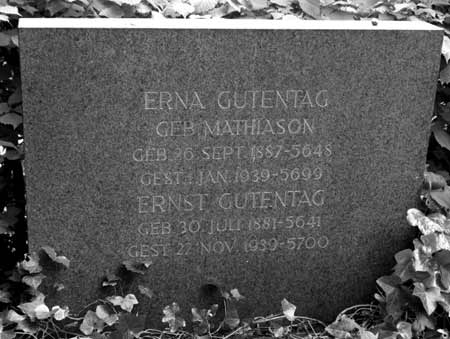Search for Names, Places and Biographies
Already layed Stumbling Stones
Suche
Erna Rosa Gutentag (née Mathiason) * 1887
Hammer Landstraße 90 (Hamburg-Mitte, Hamm)
gedemütigt / entrechtet
Flucht in den Tod 01.01.1939
further stumbling stones in Hammer Landstraße 90:
Ernst Julius Gutentag
Erna Rosa Gutentag, née Mathiason, born 26 Sep. 1887, died 1 Jan. 1939 in Hamburg
Ernst Julius Gutentag, born 30 July 1881, died 27 Nov. 1939
Hammer Landstraße / Kentzlerdamm
"Frau Gutentag had evidently overexerted herself caring for her critically ill husband, who was sent to the Eilbecktal State Hospital today by Dr. Tetzlaff wth a diagnosis of melancholia. The act was probably committed in a fit of depression.” Thus read the police report of Erna Rosa Gutentag’s suicide on New Year’s Day of 1939. The report included the comment "non-Aryan.” Her brother-in-law Rudolf Gutentag found her hanged in her apartment.
Erna Rosa Mathiason (*26 Sep. 1887 in Hamburg) married Ernst Julius Gutentag (*30 July 1881 in Jever) on 24 July 1912. They moved to Hamburg in the early twentieth century and joined the German-Israelitic Community on 26 March 1915. The couple had no children.
Rudolf Gutentag, one of Ernst’s younger brothers, moved from Jever to Hamburg to run Ernst’s business when he became ill. Ernst Gutentag had a scrap metal business at Eiffestraße 438/40, which provided the family with a comfortable living.
A few days after Erna Rosa Gutentag’s death, the District Court appointed the "consulent” Dr. Edgar Haas as legal guardian for Ernst Julius Gutentag, who was mentally unstable. He was to liquidate Gutenberg’s business and take care of issues related to the security order.
The business and property were sold to the Krohn & Dolz company, under the provision that it be made available for the development of a residential area. The sale generated 100,000 Reichsmarks, one-third of which went to Erna Rosa Gutentag’s heirs, since her dowry was taken into consideration. When the assets were inventoried, everything down to the last handkerchief was included.
Gutentag’s guardian submitted all expenses for his ward separately. The Chief Tax Authority approved the sum of 598.70 RM for the purchase of a gravestone for Erna Rosa in August 1939. Ernst Gutentag died in the hospital on 27 November 1939. The death certificate listed suicide as the cause of death.
On 1 December 1939, the guardian Dr. Hass settled the balance with Dr. Hans Bürger-Prinz, who had treated Ernst Gutentag. Additional costs were noted meticulously in the records:
Siegbert Falck completed the inscription on the gravestone, the burial costs amounted to 430 RM, the Jewish Religious Association received 265.61 RM for care of the grave, Rabbi Carlebach received 150 RM for the funeral service. The guardianship was then officially dissolved. Rudolf Gutentag was the sole heir. He was single and moved to Hamburg, where he lived with a cousin at Hansastraße 57. According to the wishes of his brother and sister-in-law, he supported relatives and his mother’s former maid, Recha Katz, with the proceeds of the inheritance. Rudolf Gutentag made plans to emigrate, but he died, on 30 July 1941, before the plans were finalized.
His funeral service was also held by Rabbi Carlebach. His grave lies in a row with those of Ernst and Erna Gutentag and of her parents at the Jewish cemetery in Ohlsdorf.
Translator: Amy Lee
Kindly supported by the Hermann Reemtsma Stiftung, Hamburg.
© Hildegard Thevs
Quellen: 1; 2 R 1939/2101, R 1940/237; 4; 5; StaH, 331-5 Polizeibehörde – Unnatürliche Todesfälle 1939/65; 522-1, Jüdische Gemeinden 390 Wählerverzeichnis 1930; 391 Mitgliederliste 1935.
Zur Nummerierung häufig genutzter Quellen siehe Link "Recherche und Quellen".


